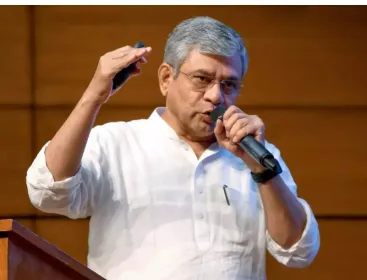

New Delhi, September 29: Union Minister for Railways, Electronics, and IT, Ashwini Vaishnaw, highlighted the rapid expansion of India’s electronics manufacturing sector, noting that new suppliers and design capabilities are emerging at a fast pace. He emphasized that this growth, led predominantly by small and medium enterprises, positions electronics manufacturing to become one of the largest sources of employment in India in the near future.
“The electronics manufacturing ecosystem is undergoing rapid growth. Every week, new suppliers, particularly from small and medium enterprises, are entering the market,” Vaishnaw stated.
In a post on X, Vaishnaw highlighted the significant advancements in design and manufacturing processes, which are enhancing India’s competitiveness in the global electronics sector.
“Design capabilities are evolving, and new designs and advanced manufacturing techniques are being developed regularly,” he said, adding that India’s electronics sector is increasingly becoming more competitive.
Looking ahead, Vaishnaw predicted that in the coming years, electronics manufacturing will emerge as a major employment sector across the country. This is in line with India’s growing transition from merely an assembly hub to a powerhouse for advanced design and chipmaking capabilities.
Earlier this month, Vaishnaw inaugurated ARM’s new semiconductor design office in Bengaluru, marking a key milestone in India’s semiconductor journey. This facility will focus on developing 2-nanometer chip technology, a groundbreaking advancement for the nation.
Notably, this will be the first time India is designing a 2-nm chip, which plays a crucial role in powering next-generation artificial intelligence devices, mobile computing, and high-performance systems. Smaller transistors offer enhanced efficiency, lower power consumption, and hold strategic significance for national security, space exploration, and defense applications.
The India Semiconductor Mission, with an allocation of Rs 76,000 crore, is a key driver behind these developments, fostering a robust semiconductor ecosystem in India. To date, 10 projects worth Rs 1.6 lakh crore have been approved across six states. Additionally, 23 chip design projects have advanced under the government’s Design Linked Incentive (DLI) Scheme, and 72 companies are utilizing state-of-the-art design tools to propel innovation.
As these initiatives take shape, India is set to emerge as a global leader in electronics manufacturing and chip development, creating vast employment opportunities in the process.